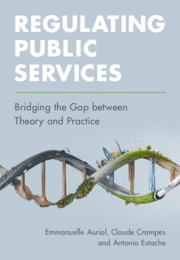Book contents
- Reviews
- Regulating Public Services
- Regulating Public Services
- Copyright page
- Contents
- Figures
- Tables
- Boxes
- Foreword
- Preface
- Acknowledgements
- Symbols
- Abbreviations
- 1 Introduction
- 2 Defining a Theoretical Normative Benchmark
- 3 Thinking Like a Monopoly about Price and Output
- 4 Regulating a Monopoly with Full Information
- 5 Regulating under Informational Constraints
- 6 Regulatory Rules to Set the Average Price
- 7 Linking Regulatory Theory to Practice through Finance
- 8 Non-Linear Pricing in Regulation
- 9 Social Concerns in Regulatory Design
- 10 Regulating Quality
- 11 On the Regulation of Investment
- 12 Regulating Multi-Product Oligopolies
- 13 Abuse of Market Power in (De)Regulated Industries
- 14 On the Relevance of Institutional Quality
- 15 Emerging Regulatory Challenges
- Bibliography
- Index
5 - Regulating under Informational Constraints
Published online by Cambridge University Press: 27 January 2022
- Reviews
- Regulating Public Services
- Regulating Public Services
- Copyright page
- Contents
- Figures
- Tables
- Boxes
- Foreword
- Preface
- Acknowledgements
- Symbols
- Abbreviations
- 1 Introduction
- 2 Defining a Theoretical Normative Benchmark
- 3 Thinking Like a Monopoly about Price and Output
- 4 Regulating a Monopoly with Full Information
- 5 Regulating under Informational Constraints
- 6 Regulatory Rules to Set the Average Price
- 7 Linking Regulatory Theory to Practice through Finance
- 8 Non-Linear Pricing in Regulation
- 9 Social Concerns in Regulatory Design
- 10 Regulating Quality
- 11 On the Regulation of Investment
- 12 Regulating Multi-Product Oligopolies
- 13 Abuse of Market Power in (De)Regulated Industries
- 14 On the Relevance of Institutional Quality
- 15 Emerging Regulatory Challenges
- Bibliography
- Index
Summary
In practice, the regulator generally has access to less information than the regulated firm on costs. In Baron– Myerson (1982) the regulated firm has private information on cost characteristics it cannot modify. In Laffont– Tirole (1986) the firm has private information on its endogenous effort to decrease cost. Regulators must pay information rent to access the information required for designing the contracts and must credibly commit to pay it to avoid a ratchet effect. The issue is politically sensitive because the ‘fee’ for information increases the operator’s profit whereas it is paid either by the consumers or the taxpayers, that is, by voters. Under adverse selection, to reduce the cost of the information rent, which is highest for the most efficient firm that is induced to produce the first-best level, less efficient firm production is distorted downward. The optimal regulation mechanism to address moral hazard risks impacting costs offers a menu of contracts where efficient firms choose a high fixed payment and produce the optimal effort while inefficient firms are constrained to choose cost-plus contracts, which again implies no rent and no effort for them.
Information
- Type
- Chapter
- Information
- Regulating Public ServicesBridging the Gap between Theory and Practice, pp. 103 - 128Publisher: Cambridge University PressPrint publication year: 2021
